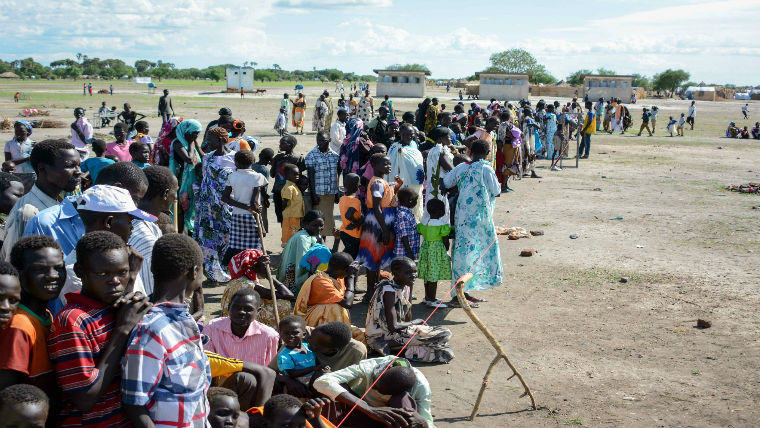Aid effort to avert South Sudan famine in jeopardy
International aid agencies have revealed that they face a shortage of £52 million ($89m) - just as the South Sudan humanitarian crisis edges closer to the risk of famine.
 Speaking out on the 3rd anniversary of the country’s independence, seven leading NGOs warned their aid efforts to help hundreds of thousands of people caught up in the conflict was under threat because many of their life-saving projects face closure due to a lack of funds.
Speaking out on the 3rd anniversary of the country’s independence, seven leading NGOs warned their aid efforts to help hundreds of thousands of people caught up in the conflict was under threat because many of their life-saving projects face closure due to a lack of funds.
South Sudan is the most pressing humanitarian crisis in Africa. Violence, hunger and sickness blight the lives of people who three years ago were hopeful of an independent future and end to war.
Some 1.5 million people have been forced to flee their homes due to fighting including nearly 400,000 people who are refugees in neighbouring countries. Many have crossed the border weak and malnourished.
Nearly 4 million people in South Sudan are facing crisis or emergency levels of hunger. Women are particularly affected by the food crisis and bear a heavy and dangerous burden. In the UN camp in Bentiu child deaths are well above emergency threshold.
World Vision, which estimates that 250,000 children are at risk of severe malnutrition, faces the largest single funding gap of £19 million ($33m).
The risk of famine is rising as the number of people requiring help is steadily rising, but the money to enable agencies to do something about this is not coming through.
The funding crisis is not affecting the agencies alone. The UN’s £1.06bn ($1.8bn) appeal is so far less than half funded.
There is a desperate need for peace in South Sudan so that people can go home, go back to school, plant crops and patch their lives back together.
International pressure is needed on all parties to the conflict to end the violence and to build a nation for all South Sudanese people. However, without more funding now, that future is slipping further away and may not exist for many.
Families’ food stocks are low due to sharing with those displaced and in some case food stocks have been looted during the course of the conflict. Food markets are not functioning and with trade routes hindered this is likely to further exacerbate the crisis. Destruction, looting and occupation of health facilities have impeded health services and many facilities lack essential supplies.
The aid effort is hampered not only by a lack of funds but also insecurity and poor roads and in some areas airdrops are the only way aid can get to people.
Perry Mansfield, director of World Vision’s programs in South Sudan said:
"We estimate that a quarter of a million children in South Sudan are at risk of severe malnutrition. Every delay in securing funds means higher risk of famine, higher risk of children being used as child soldiers, and a higher ultimate price tag to deal with this disaster.”
He added: “World Vision urgently needs to increase the tempo and scale of our response to the looming food crisis – a response that is becoming even more difficult as the rainy season leaves us fewer options to get food to those in need."